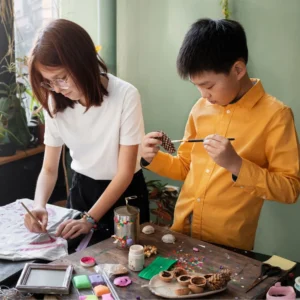
Living abroad presents an extraordinary paradox. While you’re busy creating new memories and forging fresh paths in unfamiliar territories, there’s an invisible thread that continuously pulls you back to where you began. This connection to your origins isn’t just sentimental nostalgia – it’s an essential part of maintaining your identity in a world that constantly challenges you to adapt and change.
The modern expatriate experience goes far beyond the traditional notions of homesickness or cultural adjustment. Today’s global citizens face the complex task of weaving their past into their present while building bridges toward an uncertain future. The question isn’t whether you should maintain these connections, but rather how to do so authentically and meaningfully in an increasingly digital and interconnected world.
Digital Bridges Across Oceans
Technology has revolutionized how expatriates maintain connections with their homeland, creating virtual bridges that span continents in milliseconds. Video calls have replaced handwritten letters, social media platforms serve as cultural gathering spaces, and streaming services deliver home-country content directly to foreign living rooms. Yet the real magic happens in the subtle ways technology facilitates deeper cultural engagement.
Consider the expatriate who starts a weekly virtual cooking session with their grandmother, learning traditional recipes while simultaneously teaching their own children about family culinary heritage. Or the professional who joins online book clubs focused on literature from their home country, engaging in discussions that keep their native language sharp and their cultural perspectives current. These digital connections create meaningful touchpoints that go beyond surface-level communication.
The key lies in using technology intentionally rather than passively. Instead of mindlessly scrolling through social media feeds from home, successful expatriates create structured digital experiences that serve specific purposes – whether maintaining language skills, staying current with homeland developments, or participating in virtual cultural events. This approach transforms technology from a mere communication tool into a cultural preservation mechanism.
Language as Living Heritage
Your native language carries within it the DNA of your culture – idioms that don’t translate, humor that requires cultural context, and expressions that encapsulate entire worldviews. For expatriates, maintaining linguistic connections means more than just avoiding language loss; it’s about preserving a fundamental aspect of identity that shapes how you process and understand the world.
The challenge intensifies when you’re surrounded by a different language daily. Your brain naturally adapts to prioritize the language you need for survival and success in your new environment. This adaptation, while practical, can gradually erode the nuanced understanding of your mother tongue. The solution isn’t to resist this natural process but to create intentional spaces where your native language thrives.
Reading literature, watching films, and listening to podcasts in your mother tongue serves multiple purposes. It maintains linguistic fluency while keeping you connected to evolving cultural conversations in your homeland. More importantly, it preserves the internal voice through which you process complex emotions and experiences. Many expatriates report that certain feelings can only be adequately expressed in their native language, making linguistic maintenance essential for emotional well-being.
Creating multilingual environments in your new home becomes an act of cultural preservation. This might involve labeling household items in multiple languages, maintaining libraries with books from your homeland, or establishing language-specific days within your family routine. These practices ensure that your linguistic heritage remains vibrant rather than becoming a museum piece of your past.
Cultural Traditions in Foreign Spaces
Adapting homeland traditions to foreign environments requires creativity, flexibility, and sometimes ingenious problem-solving. The expatriate celebrating a traditional harvest festival in an urban apartment, or observing religious customs in a country where those practices are uncommon, must become an innovative cultural translator.
The most successful adaptations honor the spirit of traditions rather than rigidly adhering to their original forms. This might mean celebrating a traditional spring festival with locally available flowers instead of specific homeland blooms, or adapting religious observances to fit different work schedules and social expectations. These modifications don’t diminish the tradition’s significance; they demonstrate its resilience and relevance across cultures.
Creating new traditions that blend homeland customs with local practices often produces the most meaningful results. These hybrid celebrations acknowledge both your roots and your current reality, creating unique family or community traditions that can be passed down to future generations. They represent the living evolution of culture rather than its static preservation.
The process of maintaining traditions abroad also deepens your understanding of their essential meanings. When you can’t rely on familiar environments or automatic social support for traditional observances, you must consciously choose which elements matter most. This conscious choice often leads to more intentional and meaningful practice than might occur in your homeland, where tradition might be followed more through habit than conviction.
Building Cultural Communities Away from Home
Finding others who share your cultural background can transform the expatriate experience from isolation to connection. However, building meaningful cultural communities abroad requires moving beyond surface-level interactions based solely on shared nationality or ethnicity. The most vibrant expatriate communities are built around shared values, interests, and life experiences rather than just common origins.
Healthcare in portugal represents just one of many practical considerations that bring expatriate communities together, as shared challenges around navigating new systems create natural bonding opportunities. These practical connections often evolve into deeper cultural relationships as people discover common ground beyond immediate needs.
Effective cultural communities abroad serve multiple functions simultaneously. They provide practical support for navigating new environments, emotional support during challenging transitions, and cultural continuity through shared celebrations and traditions. Most importantly, they create spaces where you can be fully yourself without explanation or translation, where cultural references are understood immediately and where your homeland identity is validated and celebrated.
The digital age has expanded community possibilities beyond geographic boundaries. Virtual cultural communities can supplement or sometimes replace local groups, connecting you with people who share your specific regional background, professional interests, or life circumstances. These online communities often provide more targeted support and understanding than broader local expatriate groups.
Passing Heritage to the Next Generation
For expatriate parents, maintaining cultural connections becomes exponentially more complex as they navigate raising children who may feel more connected to their birth country than their parents’ homeland. These children, often called third culture kids, require different approaches to cultural connection that honor both their immediate environment and their inherited heritage.
The challenge lies in making distant cultures relevant and meaningful to children whose daily experiences are shaped by their current location. This requires moving beyond superficial cultural elements like food and festivals to deeper concepts like values, worldviews, and family histories. Stories become crucial tools, transforming abstract concepts of homeland into concrete narratives that children can understand and relate to.
Creating opportunities for children to visit their parents’ homeland, when possible, provides irreplaceable firsthand cultural experiences. However, even without physical visits, parents can create immersive cultural experiences through language, literature, music, and virtual connections with extended family. The goal isn’t to recreate homeland childhoods but to provide children with a rich understanding of their cultural heritage that they can choose to embrace or adapt as they mature.
Transforming Challenges into Opportunities
The expatriate journey inevitably involves losses – missed family celebrations, evolving friendships strained by distance, and cultural references that gradually become outdated. However, these losses often create space for unexpected gains. Distance can provide perspective on your homeland culture, allowing you to appreciate aspects you might have taken for granted while also recognizing elements you’re happy to leave behind.
Many expatriates discover that maintaining cultural connections from abroad actually deepens their understanding of their heritage. The effort required to preserve traditions, maintain language skills, and stay current with homeland developments creates a more conscious and intentional relationship with culture than might exist for those who never leave home.
The expatriate experience also creates unique opportunities to become cultural ambassadors, sharing your heritage with people who might never otherwise encounter it. Teaching traditional recipes to neighbors, explaining cultural celebrations to colleagues, or sharing literature and music from your homeland enriches both your new community and your own sense of cultural pride.
Conclusion
Staying connected to your roots as an expatriate isn’t about recreating your homeland in a foreign place or refusing to adapt to new environments. It’s about creating a dynamic, evolving relationship with your cultural heritage that honors your past while embracing your present reality. This connection provides stability during times of change, identity anchoring during periods of adaptation, and cultural richness that enhances your expatriate experience.
The most successful expatriates develop flexible approaches to cultural connection that can adapt to changing circumstances, life stages, and opportunities. They understand that maintaining roots doesn’t mean remaining static, but rather growing in ways that honor both where they came from and where they’re going. In this balance between preservation and adaptation, expatriates often discover not just how to stay connected to their roots, but how to help those roots flourish in new soil.






